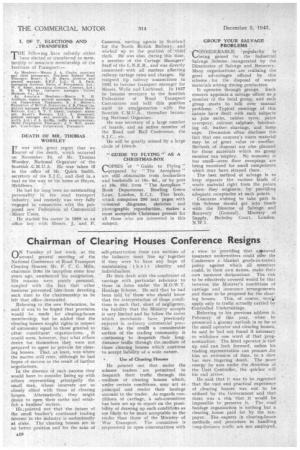Chairman of Clearing Houses Conference Resigns
Page 18

If you've noticed an error in this article please click here to report it so we can fix it.
ro Tuesday of last week, at the klanenal general meeting of . the National Conference of Road Transport Clearing Houses, Mr. F. C. G. Mills, chairman frcrrn its inception some four years ago, announced his resignation. His reasons were purely personal, coupled with the fact that other business prevented bim---from devoting such time to the chairmanship as he felt that office demanded.
Referring to the new Federation, he said it was to be hoped that provision would be made for clearing-house membership, but he added that the clearing houses sought rights in respect of autonomy equal to those granted to other constituent organizations, It would seem, however, that what others desire for themselves they were not prepared to agree to provide for clearing houses. That, at least, was where the matter .still rests, although he had hopes of success as the result of further negotiations.
In the absence of such success they would have to consider lining up with others representing principally the small man, whose interests are so closely allied with those of clearing houses. Alternatively, they might &Sire to open their ranks and estabfish a hauliers' section.
lie.pointed out that the, future of the small haulier's continuedtrading interest in the. industry is undoubtedly at stake. The clearing houses are in no better position and for the sake of
self-preservation these two sections of the industry must line up together if they were to have any hope of maintaining their identity and individualism.
He then dealt with the conditions of carriage with particular reference to those in force under the M.O.W.T. Haulage Scheme. He said that he had been told by' those who should know that the interpretation of those conditions is such that, short of negligence, the liability that the Ministry accepts is very limited and far below the cover which merchants have previously enjoyed in ordinary commercial practice. • As the result a considerable section of the trading community is continuing to despatch their longdistance traffic through the.medium of those clearing houses which continue to accept liability of a wide nature.
Use of Clearing Houses
He pointed out that under the scheme traders are permitted to despatch their traffic through the medium of clearing houses which, under certain conditions, may act as principal and render their haulage account to the trader. As regards con-. ditions of carriage, a sub-committee has been set up to report on the possibility of drawing up such conditions as are likely to be more acceptable to the trader than those of the Ministry of 'War _ Transport. The committee is empowered to open conversatiOns with
a view to providing that approved insurance underwriters could offer the Conference a blanket goods-in-transit policy against which all members could, in their own names, make their own turnover declarations. The risk to be effectively covered would be that between the Minister's conditions of carriage and insurance arrangements and those to be proposed for the clear
ing houses. This, of course, wou'al apply only to traffic actually carried by Controlled Undertakings.
Referring to his previous address it. February of this year, when he presented a gloomy outlook in so far as the small operator and clearing houses, he said he had not found it necessary to withdraw one word of that prognostication. The hired operator is tied up and can look forward, unless his trading representation can procure .for him an extension of time, to a slow but sure lingering death. The more energy he. uses under the direction of the Unit Controller, the quicker will his end arrive.
He said that it was to be regretted that the vast and practical experience of clearing houses was not to he utilized by the GoVernment and that there was a risk that it would be impossible to preserve it. The road haulage organization is nothing but a clearing house paid for by the taxpayer. The experts in clearing-house methods_ and procedure in handling tong-distance traffic are not employed.




















































